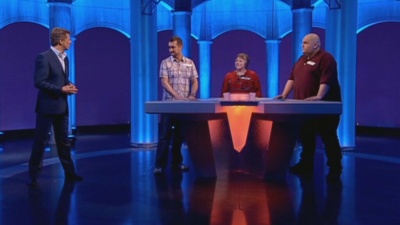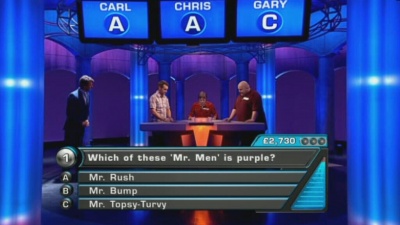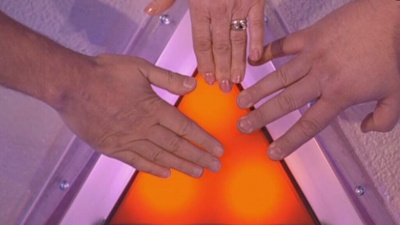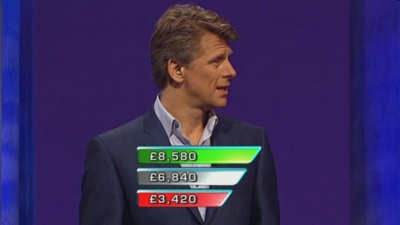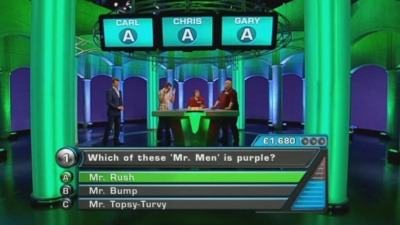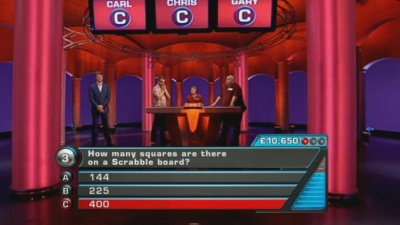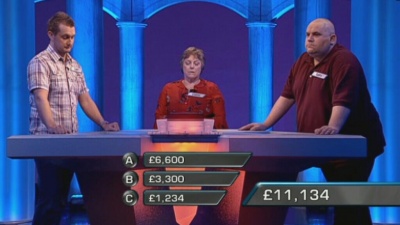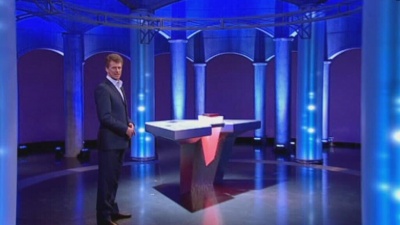Divided
(Amazing what you learn from YouTube - that man Sylvan composed the music for this show too ;)) |
|||
| Line 64: | Line 64: | ||
Based on an idea by John de Mol. Original format by Talpa Content B.V. and licensed by Talpa Content Exploitatie BV. | Based on an idea by John de Mol. Original format by Talpa Content B.V. and licensed by Talpa Content Exploitatie BV. | ||
| + | |||
| + | ==Theme music== | ||
| + | |||
| + | Marc Sylvan | ||
== Trivia == | == Trivia == | ||
Revision as of 02:47, 12 October 2020
Contents |
Host
Co-hosts
Question master:
Series 1: Charlotte Hudson
Series 2: Rachel Pierman
Broadcast
Talpa and Brighter Pictures for ITV1, 18 May to 26 June 2009 (30 episodes in 1 series)
Talpa and Remarkable Television for ITV1, 6 April to 7 May 2010 (23 episodes in 1 series + 7 unaired)
Synopsis
Three strangers face a series of general knowledge questions in the hope of winning tens of thousands of pounds. Each episode has five rounds, with the number of questions required to successfully complete the round decreasing, and the amount of money on offer increasing in each round, according to the following pattern -
Round 1 - 5 questions, each worth £3000
Round 2 - 4 questions, each worth £7500
Round 3 - 3 questions, each worth £15,000
Round 4 - 2 questions, each worth £30,000
Round 5 - 1 questions, each worth £75,000
For each question they are asked, within 100 seconds, they must unanimously agree on the same answer and then "lock" the answer in. However for every second they deliberate, the potential prize money is reduced by 1% of that round's maximum prize (so for example a one second deliberation in the first round would reduce the potential prize money by £30). Each question is multiple choice out of three, except the single question in round five where the team must put the three answers in the correct order.
A correct answer makes the lights around the team turn green, while a wrong answer turns the lights red. Each team is allowed three incorrect answers. If they answer incorrectly, their prize money is halved. On the third mistake, they go home with nothing.
At the end of each round, the team must decide inside 15 seconds whether or not to continue. Each team member must lock in their choice, with a unanimous decision required in order for the team to stop. If a unanimous decision is not reached, the team automatically move on to the next round.
When the group decide to stop, they must then play the jackpot round. The money that they have accumulated is split into three unequal amounts. These amounts vary, but are usually one of the following percentage breakdowns - 50%/40%/10%, 60%/30%/10% or 70%/20%/10%. Once the amounts have been revealed, each team member is given 15 seconds to briefly state which amount (labelled A, B, and C) think they deserve and why. In the event two or more team members choose the same amount of money, a 100 second countdown is started, during which they must convince each other to swap which amount they have gone for, so each team member gets one of the amounts, at which point they can lock-in and stop the countdown. All the time while they deliberate (read: argue) about who should get what however, their money is draining away. After 50 seconds, there is a brief pause, while the host reminds them that half of the money they earned has now gone. The countdown is then restarted until either the team all choose a different amount and lock-in, or the countdown ends and the money all goes. There then follows a brief piece-to-camera from the joyous, unhappy, gloating, jealous (delete as applicable) team members about what just happened.
Like its early evening stalemate Golden Balls, the format isn't bad until right at the end, when it takes an unnecessarily nasty turn, by allowing, nay, almost encouraging people to turn on their fellow human beings for their own personal gain. However despite Golden Balls having countless examples of some of the worst examples of greed in people being displayed for all to see, Divided somehow manages to top this. When you have a contestant who just wants a little bit of cash to help them do something in life, and is quite happy to take the smallest amount, reduced to tears because their so-called team-mates are so stubborn and downright greedy, they would rather go home with nothing than know someone else went away with more, it leaves a very bad taste in the mouth. This isn't something we like to see, and we hope this type of programme was merely a passing fad in TV game shows, and not something that will we see used again.
Catchphrases
'The longer you take, the less you make'
Inventor
Based on an idea by John de Mol. Original format by Talpa Content B.V. and licensed by Talpa Content Exploitatie BV.
Theme music
Marc Sylvan
Trivia
Based on the Dutch programme De Gemene Deler, which literally translates as The Common Denominator, but not The Common Denominator we saw on Channel 4 a few years later.
The theoretical maximum prize is £225,000. However to win this the team would have to answer every single question correctly within one second, and also spend less than a second deliberating over who gets what at the end, meaning this sum is virtually impossible to win.


